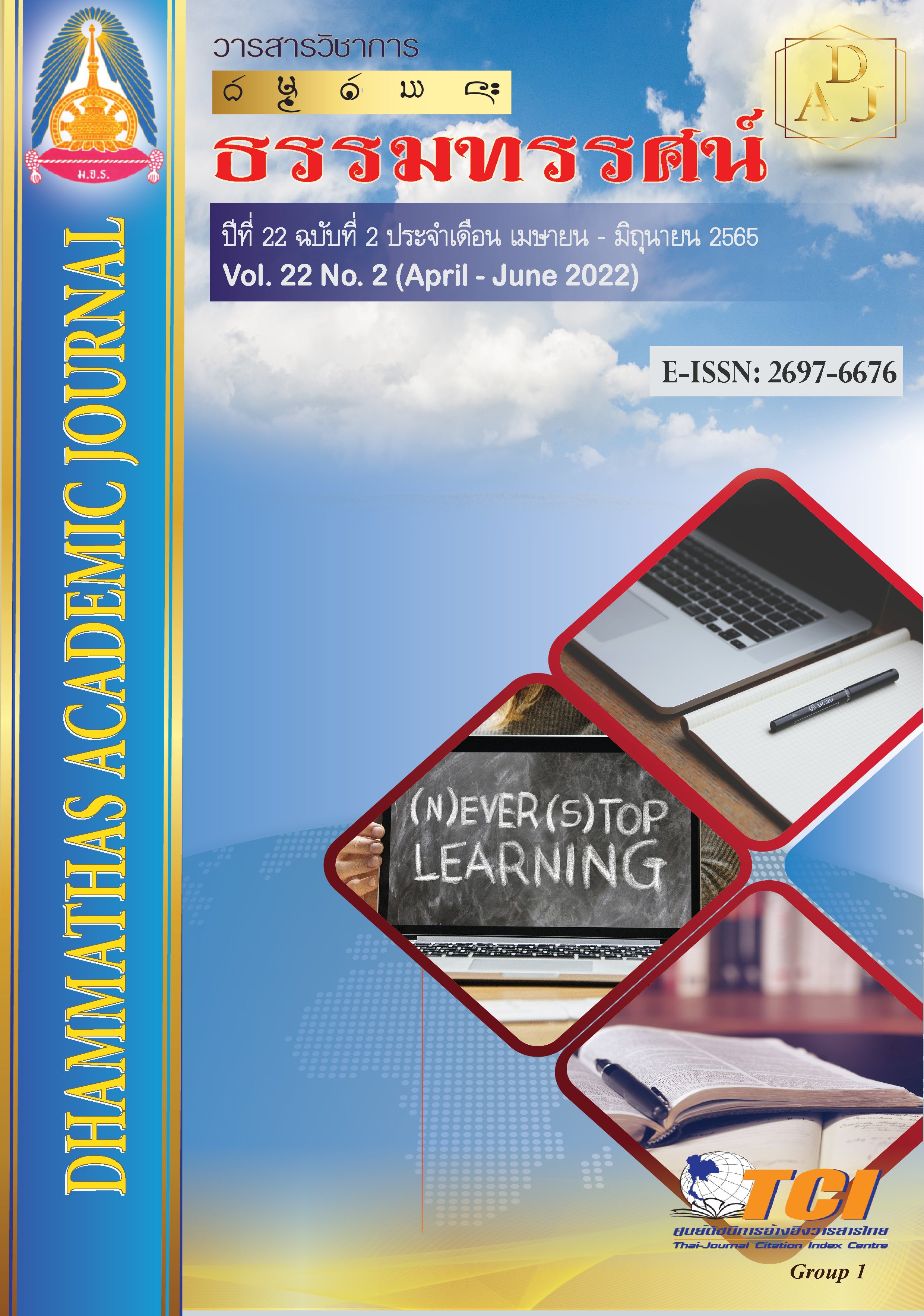The Relationship betweenthe Local Cultureand the Local Electoral
Main Article Content
Abstract
The purpose of this study 1) to study the level of the relationship between local culture and local electoral vote 2) to study the relationship between the local culture and the local electoral vote 3) to study the local culture that effect to the local electoral vote 4) to find out the suggestions in which local culture for presented to the executives and related parties for the local elections development. This research approaches of mixed methods research was applied by combining the quantitative and qualitative methods. The quantitative method was conducted by studying 400samples, from the permanent secretary of the local administrative organization and voters of Mueang Khon Kaen District, this sample derived from Taro Yamane. For the qualitative method was conducted by interviewing from 18 the secretary of the local administrative organization, selected by purposive sampling. The tool used to collect data was questionnaire. The statistics used to analyze data included percentage, mean, standard deviation, and the hypothesis test by the correlation analyzing and multiple regressions. The qualitative method was conducted by interview form, from 18 the secretaries of the local administrative organization. The data were analyzed by using content analysis.
The research results were show as follows:
1. The local culture was at the highest level. The aspect with the highest mean was the rights and liberties of individuals, followed by the principle of equality and the least was the majority votes.
2. The overall local electoral vote was at the highest level. The aspect with the highest mean was go to the polls, followed by cast a ballot, and the least was the timing of voting decisions in election.
3. The local culture were a positive correlation with the local electoral vote, r = 0.679 was statistically significant at the .01 level, the regression analysis found that the rights and liberties of individuals, the principle of equality, the principle of consent, the principles of sovereignty and the principles of majority that influenced to the local electoral vote. As consistent with hypothesis.
Article Details

This work is licensed under a Creative Commons Attribution-NonCommercial-NoDerivatives 4.0 International License.
เพื่อให้เป็นไปตามกฎหมายลิขสิทธิ์ ผู้นิพนธ์ทุกท่านต้องลงลายมือชื่อในแบบฟอร์มใบมอบลิขสิทธิ์บทความ ให้แก่วารสารฯ พร้อมกับบทความต้นฉบับที่ได้แก้ไขครั้งสุดท้าย นอกจากนี้ ผู้นิพนธ์ทุกท่านต้องยืนยันว่าบทความ ต้นฉบับที่ส่งมาตีพิมพ์นั้น ได้ส่งมาตีพิมพ์เฉพาะในวารสาร วิชาการธรรม ทรรศน์ เพียงแห่งเดียวเท่านั้น หากมีการใช้ ภาพหรือตารางของผู้นิพนธ์อื่นที่ปรากฏในสิ่งตีพิมพ์อื่นมาแล้ว ผู้นิพนธ์ต้องขออนุญาตเจ้าของลิขสิทธิ์ก่อน พร้อมทั้ง แสดงหนังสือที่ได้รับการยินยอมต่อบรรณาธิการ ก่อนที่บทความจะได้รับการตีพิมพ์References
กัมลาศ เยาวะนิจ. (2562). วัฒนธรรมไทยกับการมีส่วนร่วมทางการเมืองในระดับท้องถิ่น. วารสารวิจัยและพัฒนาวไลยอลงกรณ์ ในพระบรมราชูปถัมภ์, 10(2), 23-33.
กาญจนา พันธุ์เอี่ยม และคณะ. (2556). ทัศนคติและพฤติกรรมการใช้สิทธิการเลือกตั้งสมาชิกสภาผู้แทนราษฎรของผู้นำชุมชน เทศบาลเมืองหัวหิน จังหวัดประจวบคีรีขันธ์. (รายงานการวิจัย). นครปฐม: มหาวิทยาลัยเทคโนโลยีราชมงคลรัตนโกสินทร์.
เกียรติกร พากเพียรศิลป์ และคณะ. (2552). ปัจจัยที่มีผลต่อการตัดสินใจลงคะแนนเสียงเลือกตั้ง สมาชิกสภาผู้แทนราษฎร: กรณีศึกษาการเลือกตั้งสมาชิกสภาผู้แทนราษฎรจังหวัดปราจีนบุรี. (สารนิพนธ์รัฐศาสตรมหาบัณฑิต). กรุงเทพมหานคร: มหาวิทยาลัยเกริก
จิติล คุ้มครอง. (2560). พฤติกรรมการเลือกตั้งของประชาชนในกรอบรัฐธรรมนูญพุทธศักราช 2560: ศึกษากรณีการเลือกตั้งสมาชิกสภาผู้แทนราษฎร เขต 2 จังหวัดชลบุรี. (วิทยานิพนธ์รัฐประศาสนศาสตรมหาบัณฑิต). ชลบุรี: มหาวิทยาลัยบูรพา.
เฉลิมพล นุชอุดม. (2562). เกณฑ์ในการตัดสินใจเลือกผู้แทนระดับท้องถิ่น ในเขตกรุงเทพมหานคร. วารสารวิชาการมหาวิทยาลัยปทุมธานี, 11(2), 32-44.
ฐานิตา เฉลิมช่วง (2559). ปัจจัยที่ส่งผลต่อการมีส่วนร่วมทางการเมืองของประชาชนในระดับเทศบาล จังหวัดฉะเชิงเทรา. วารสารชุมชนวิจัย, 10(1), 82-90.
ทินพันธุ์ นาคะตะ. (2556). วิถีชีวิตไทย: วัฒนธรรมทางการเมืองของคนรุ่นใหม่. กรุงเทพฯ: สหายบล็อก.
นุชปภาดา ธนวโรดม. (2557). พฤติกรรมการเลือกตั้งของผู้มีสิทธิเลือกตั้งในเขตเทศบาลนครสวรรค์. (วิทยานิพนธ์พุทธศาสตรมหาบัณฑิต). พระนครศรีอยุธยา: มหาวิทยาลัยมหาจุฬาลงกรณราชวิทยาลัย.
ประจักษ์ ก้องกีรติ. (2555). การเมืองว่าด้วยการเลือกตั้ง: วาทกรรม อำนาจ และพลวัตชนบทไทย. นนทบุรี: ฟ้าเดียวกัน.
พระอธิการวรวุฒิ สุเมโธ (มีธรรม). (2564). พฤติกรรมของประชาชนในการเลือกตั้งสภาผู้แทนราษฎร พ.ศ. 2562 ในจังหวัดนครราชสีมา เขตเลือกตั้งที่ 5. วารสารวิชาการ มจร. บุรีรัมย์, 6(2), 103-115.
พันธุ์ทิพา อัครธีรนัย. (2559). ปัจจัยที่มีผลต่อการตัดสินใจในการเลือกตั้งสมาชิกสภาผู้แทนราษฎรจังหวัดนครนายก: ศึกษาในช่วงเวลา พ.ศ. 2559. (วิทยานิพนธ์รัฐศาสตรมหาบัณฑิต). กรุงเทพฯ: มหาวิทยาลัยเกริก.
ยงยุทธ พงษ์ศรี. (2562). ปัจจัยที่มีผลต่อการเลือกตั้งสมาชิกสภาผู้แทนราษฎรในจังหวัดปทุมธานี: ศึกษาในห้วงเวลาปี พ.ศ. 2562. (วิทยานิพนธ์รัฐศาสตรมหาบัญฑิต). กรุงเทพฯ: มหาวิทยาลัยเกริก.
ลัดดา งามโสภา. (2553). แนวทางการพัฒนาพฤติกรรมการเลือกตั้งของผู้มีสิทธิเลือกตั้งในเขตอำเภอขาณุวรลักษบุรี จังหวัดกำแพงเพชร. (วิทยานิพนธ์ศิลปศาสตรมหาบัณฑิต) กำแพงเพชร: มหาวิทยาลัยราชภัฎกำแพงเพชร.
วิรัช เพียรชอบ. (2552). พฤติกรรมการใช้สิทธิทางการเมืองของผู้มีสิทธิเลือกตั้งในเขตพื้นที่องค์การบริหาร ส่วนตำบลทุ่งควายกิน อำเภอแกลง จังหวัดระยอง. (วิทยานิพนธ์ศิลปศาสตรมหาบัณฑิต). จันทบุรี: มหาวิทยาลัยราชภัฏรําไพพรรณี
สมเกียรติ วันทะนะ. (2557). ระบบประชาธิปไตยเปรียบเทียบ. กรุงเทพฯ: สมาคมรัฐศาสตร์แห่งมหาวิทยาลัยเกษตรศาสตร์.
หัชชากร วงศ์สายัณห์. (2560). ระบบคุณค่าในวัฒนธรรมการเลือกตั้งท้องถิ่น. วารสารรัฐศาสตร์ปริทรรศน์ มหาวิทยาลัยเกษตรศาสตร์, 4(2), 62-74.
Almond, G. & Verba, S. (1963). Comparative political today. Boston: Little Brown and Company.
Callahan, W. A. (2005). Vote Buying and Village Outrage in an Election in Northern Thailand: Recent Legal Reforms in Historical Context. The Journal of Asia Studies, 67(3), 169-511.
Walker, A. (2008). The rural constitution and the everyday politics of elections in Northern Thailand. Journal of contemporary Asia, 38(1), 84-105.

